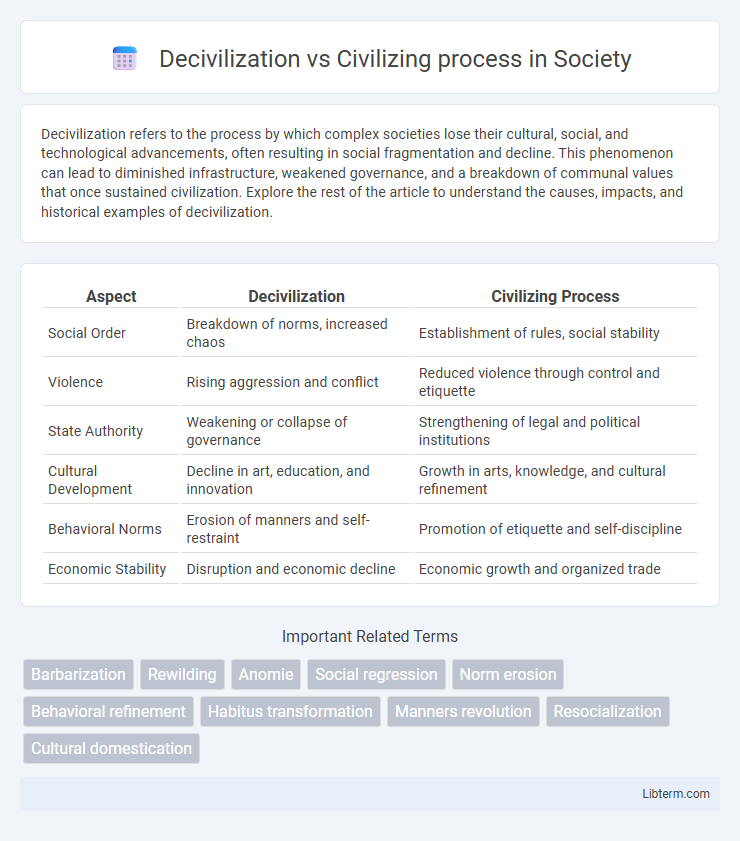Decivilization refers to the process by which complex societies lose their cultural, social, and technological advancements, often resulting in social fragmentation and decline. This phenomenon can lead to diminished infrastructure, weakened governance, and a breakdown of communal values that once sustained civilization. Explore the rest of the article to understand the causes, impacts, and historical examples of decivilization.
Table of Comparison
| Aspect | Decivilization | Civilizing Process |
|---|---|---|
| Social Order | Breakdown of norms, increased chaos | Establishment of rules, social stability |
| Violence | Rising aggression and conflict | Reduced violence through control and etiquette |
| State Authority | Weakening or collapse of governance | Strengthening of legal and political institutions |
| Cultural Development | Decline in art, education, and innovation | Growth in arts, knowledge, and cultural refinement |
| Behavioral Norms | Erosion of manners and self-restraint | Promotion of etiquette and self-discipline |
| Economic Stability | Disruption and economic decline | Economic growth and organized trade |
Introduction to Decivilization and the Civilizing Process
Decivilization refers to the gradual breakdown of social norms, institutions, and cultural coherence, leading to increased violence, disorder, and regression from structured civilization. The civilizing process, as analyzed by sociologist Norbert Elias, describes the long-term development of self-restraint, social manners, and centralized authority that form the foundation of modern societies. Understanding the dynamic interplay between decivilization and the civilizing process highlights the fragile balance sustaining social order and the potential for societal relapse.
Historical Origins of Civilizing Theories
The historical origins of civilizing theories trace back to Enlightenment thinkers like Montesquieu and Rousseau, who explored the transformation from primitive societies to organized states through laws, manners, and cultural norms. These theories contrast with Decivilization concepts, which emphasize the breakdown of social order due to war, economic collapse, or cultural decay, as noted by scholars analyzing the fall of empires such as Rome and Mesopotamia. Modern interpretations often debate the cyclical nature of civilization, highlighting phases of cultural advancement and regression influenced by political, social, and environmental factors.
Key Thinkers: Norbert Elias and Beyond
Norbert Elias' concept of the civilizing process emphasizes the gradual development of social norms, self-restraint, and hierarchical integration that shape modern societies. Critics of Elias highlight the contrasting idea of decivilization, where social order breaks down, leading to increased violence and chaos, as explored by thinkers like Wolfgang Sofsky and Zygmunt Bauman. This debate illuminates the dynamic tensions between social stabilization and regression within historical and contemporary contexts.
Cultural Markers of Civilization
Cultural markers of civilization include complex language, written records, established legal systems, and advanced technological innovations, which distinguish organized societies from less structured ones. The decivilization process often entails the erosion or loss of these markers, resulting in diminished social cohesion, breakdown of institutions, and regression in artistic and intellectual achievements. Preservation and reinforcement of cultural markers are crucial for sustaining the civilizing process and preventing societal decline.
Drivers and Symptoms of Decivilization
Decivilization is driven by factors such as political instability, economic collapse, social fragmentation, and environmental degradation, leading to the breakdown of social order and institutions. Symptoms include rising violence, erosion of trust, weakening of legal frameworks, and loss of cultural cohesion. These elements collectively undermine the civilizing process, which seeks to establish complex social norms, governance, and cooperative behavior.
The Role of Violence in Societal Change
Violence acts as a catalyst in both decivilization and the civilizing process, reshaping social structures through conflict and upheaval. In decivilization, escalating violence often leads to the breakdown of legal and moral norms, resulting in social fragmentation and chaos. Conversely, the civilizing process gradually suppresses violent behavior via institutional control, socialization, and the establishment of monopolized force by the state to maintain order.
Social Norms: Formation and Erosion
The civilizing process establishes social norms through structured interactions, enabling collective behavioral standards and enhancing social cohesion. Decivilization manifests as the erosion of these norms, often triggered by crises or weakened institutions, leading to increased social disorder and conflict. Understanding the dynamic between norm formation and erosion reveals the fragile foundation upon which stable societies depend.
Institutions: Agents of Civilization or Decivilization?
Institutions function as critical agents shaping the processes of civilization or decivilization by enforcing social norms, laws, and cultural values that either stabilize or destabilize societies. Effective institutions promote order, cooperation, and the rule of law, thereby driving the civilizing process by embedding trust and mutual respect within communities. Conversely, dysfunctional or corrupt institutions can precipitate decivilization, fostering violence, social fragmentation, and the erosion of collective well-being.
Case Studies: Modern Trends and Historical Examples
Decivilization refers to the breakdown of social norms and institutions, as seen in the collapse of the Roman Empire and the decline in law enforcement during the 1970s in New York City, while the civilizing process describes the gradual development of social order and state control exemplified by the rise of centralized states in medieval Europe and the implementation of public health measures in 19th-century London. Modern trends such as the resurgence of populist movements and urban decay highlight ongoing tensions between these opposing forces, where globalization and technological advances simultaneously promote civilizing efforts through education and infrastructure but also exacerbate social fragmentation. Historical examples demonstrate that the civilizing process is non-linear and subject to reversals during crises like economic depressions, wars, or pandemics, making the study of these dynamics essential for understanding contemporary social stability and disorder.
Future Trajectories: Civilizing or Decivilizing Societies?
Future trajectories of societies hinge on the balance between decivilization and civilizing processes, with factors such as technological innovation, social cohesion, and governance structures playing critical roles. Increasing digital surveillance and social fragmentation may accelerate decivilization by undermining trust and collective norms, whereas investments in education, inclusive policies, and sustainable development promote civilizing trends. Scholars like Norbert Elias emphasize that the civilizing process depends on long-term cultural evolution, making contemporary challenges pivotal in determining whether societies progress toward greater order or regress into chaos.
Decivilization Infographic

 libterm.com
libterm.com